In conversation
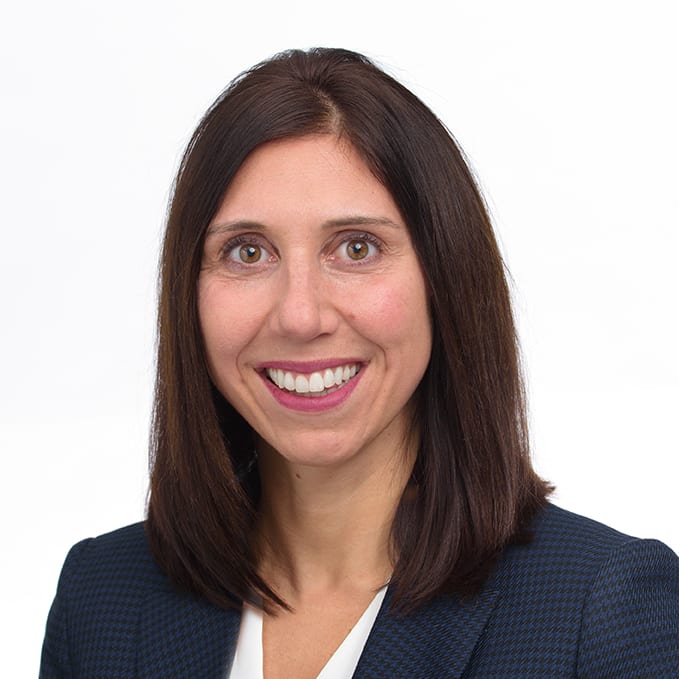 Jennifer Blatz
Jennifer Blatz
President and CEO, StriveTogether
Learn more about Jennifer >>
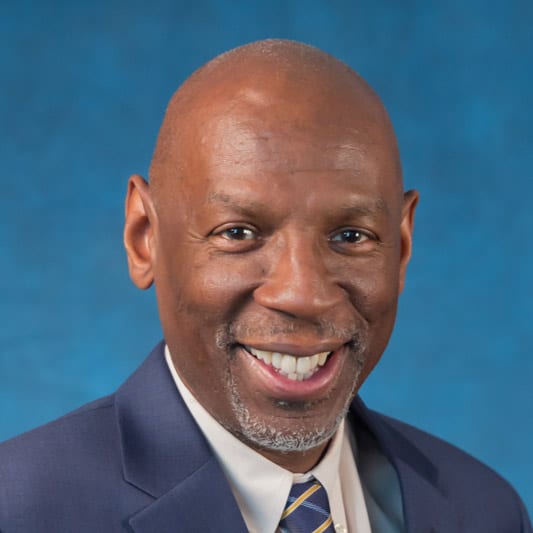 Geoffrey Canada
Geoffrey Canada
President, Harlem Children’s Zone
Learn more about Geoffrey >>
Host
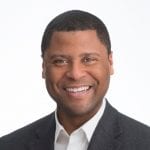 Christian Motley
Christian Motley
Senior manager of policy and partnerships, StriveTogether
Transcript
Christian Motley, senior manager, policy and partnerships
[00:20] Hi, I’m Christian Motley, senior manager of policy and partnerships for StriveTogether. Welcome to Together for Change, where we explore what’s possible when people work together for an equitable recovery. Today we’re talking with Geoffrey Canada, president of the Harlem Children’s Zone, and Jennifer Blatz, president and chief executive officer of StriveTogether.
Harlem Children’s Zone has been described by the New York Times as one of the most ambitious social policy experiments of our time. Geoff has worked with the Harlem Children’s Zone for more than 30 years and is known as a passionate advocate for education reform. Thank you for joining us today, Geoff.
Geoffrey Canada, president, Harlem Children’s Zone
[00:53] Oh, I’m so excited to be here. And thanks for inviting me.
Christian Motley
[00:57] StriveTogether is a national movement with a clear purpose, helping every child succeed in school and in life, cradle to career, regardless of race, ethnicity, zip code or circumstance. Jennifer has been at StriveTogether from the very beginning, spending the last two decades designing and implementing strategies that drive large-scale change in nearly 70 communities across the country. Hi, Jennifer.
Jennifer Blatz, president and CEO, StriveTogether
[01:18] Hi, Christian, glad to be with you. And really glad to be with Geoff.
Christian Motley
[01:23] Let’s jump right in. Geoff, your success in Harlem has served as a social impact model for communities across the country. Tell us, what have you learned over the years leading in this place-based work?
Geoffrey Canada
[01:36] Well, you know, I like to start from the Harlem Children’s Zone perspective. This work is hard. And no matter how long you’ve been at it, you are constantly finding out that the things you need to improve on.
So, a couple of things that I would just say, in general, about the work we’re doing. It is complicated. And the ability to care about children at every developmental stage of their life means that you’ve got to have this complexity. And then when you throw in scale on top of complexity, you end up working in conditions that really you have to be maximally flexible, learning all the time.
[02:23] But most important, and you know, Christian, I think this is a thing that has, I think, allowed some folks to excel and some not. You have to be able to look failure squarely in the eye and say, “You know what, we tried hard, it didn’t work. We need to do something different.” And people who can do that I think can be successful at this work. They can deal with the complexity, they can deal with scale and they can deal with the fact that a lot of things we try aren’t going to work, and we can’t just continue to do things that aren’t working.
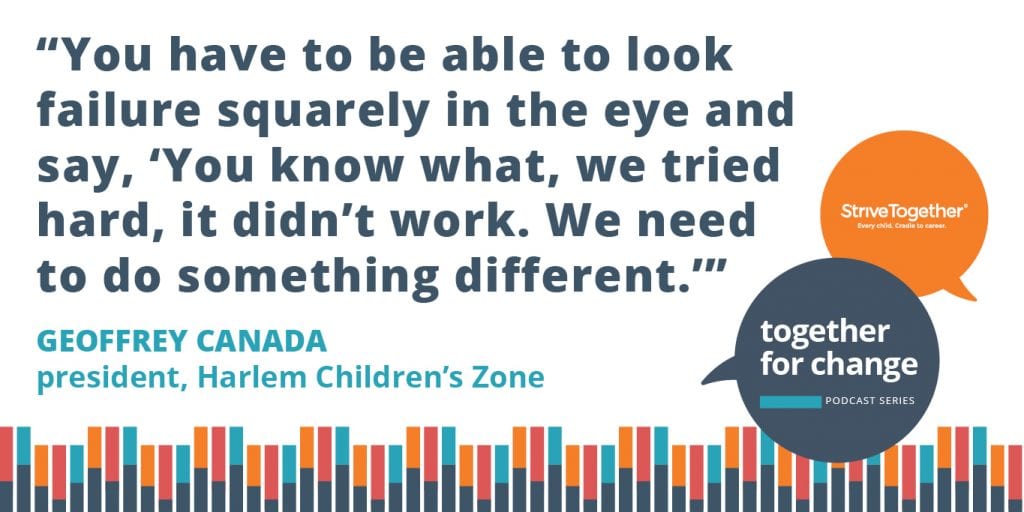
Christian Motley
[02:58] And, you know, is — based on, you know, again, given those 30 years, is there anything you would do differently, I don’t know, from the start till now?
Geoffrey Canada
[03:08] Well, you know, one of the one of the biggest mistakes we made as an organization, there was a time when the land in Harlem had no value. Mayor Giuliani was mayor. He was literally trying to give real estate away in Harlem to get it off the tax rolls. And because the community had fallen apart so dramatically, nobody wanted to buy anything. It’s like a lot of communities around the country, which were redlined — the property loses value, you end up with abandoned buildings, dirty lots, trash, you know, vermin, all of that kind of stuff.
And there was an opportunity to create something like a Land Trust, where we could have bought up a bunch of property, because we thought in rebuilding Harlem, people were going to want to come to live there. And I passed on the opportunity to even think strategically about housing. And I, you know, and at the time, it made total sense. I didn’t know anything about housing. I believe don’t do things that you know, are going to pull you out of your sweet spot than when you’re trying to do something new.
[04:20] But what I have said to other folks who are starting this work in similar communities: you can be sure if you’re going to be successful, the value of that property is going to increase. And the tenants and residents who live there should benefit from that increase so gentrification doesn’t happen. And the folks who have suffered the longest end up getting no benefit from the increase and the rebuilding of community. So that was a mistake.
We need housing for our college students. We have all these college students coming home. It’d be lovely to have, you know, efficiency studios for them to start their careers in Harlem and an affordable place right now. And we lost that opportunity.
Christian Motley
[05:07] Jennifer, I’d ask the same question of you. You know, hindsight is always 20/20. What do you know now or understand better that you wish you’d known 20 years ago when you picked up this work?
Jennifer Blatz
[05:16] Well, first of all, 20 years ago, wow, that is a long time. And there have been many, many fail forwards. Thank you, Geoff, for sharing that story. If we’re not continually learning, and if we’re not looking failure square in the face, then we’re not doing the work. We’ve always said in this work that we’ve been building the plane as we’re flying it, and there have been lots of mistakes.
So, while the list is long, I probably narrow it down to just a few key things that I think we’re working on really, really hard now as a network. And those are community engagement and really authentic community engagement. I would say making the implicit explicit, especially when it comes to leading on race and racial and ethnic equity. And then the importance of policy work. And certainly, Christian, you know how important that is in our work.
[06:13] When we start started this work in Cincinnati, you know, when we were doing the StrivePartnership work in the early days, we really thought that we were authentically engaging the community. I remember going to listening sessions, you know, we would have these community listening sessions in a church basement, but we would come in with the ideas baked. If we’re honest about what we did, we were looking at the data, we had some solutions in mind, we would come in and talk with the community about it and sort of get their buy in.
And we would talk about like “We’re going to get community buy in,” and we were never co-developing the solutions with those who are most impacted by the solutions. And that has been a huge shift in our work, and how we work with our partnerships across the Network. And it’s hard to do that, it takes time. It takes setting agendas aside, but it is the most important work in order to get the desired results that solutions have to be co-developed. We have to shift and share power with community to really get to the best solutions for children and families.
[07:14] On the on the racial and ethnic equity work, you know, when we would say early on that our vision for every child, I remember saying this multiple times, and you know, the idea of, “Every child, that is equity, we’re talking about every child here.” But we were not being explicit about race, and racial and ethnic equity in this work.
And, you know, we were pushed in Cincinnati in the early days of the work as we started to find other communities across the country doing this work, I remember a few partnerships really pushing us about how could we be leading this work and telling other communities how to do this work, when we weren’t disaggregating our own data and really naming race and the impact and the implications of race in this work. And we’ve become much more explicit in leading on race over the last few years, and we still have a long way to go as a network.
[08:09] And then lastly, as I mentioned, the importance of policy. We took on this sort of practice-up mentality where we had to get proof points and get things right before we would really try and shape and shift policy. And I love — I mean, we’ve obviously benefited so much from the work that Geoff and the Harlem Children’s Zone has led certainly in driving policy and federal policy, as it relates to Promise Neighborhoods. Where we are now is, is seeing in our local communities, and then together with Promise Neighborhoods, and the work that Geoff and team at Harlem Children’s Zone and the William Julius Wilson Institute are leading, we can really think about shaping policy. We have to be proactive about that.
That’s the way that systems are transformed, is when policy changes. Essentially, the incremental changes, as it relates to outcomes are important, but not sufficient to get to population-level change.
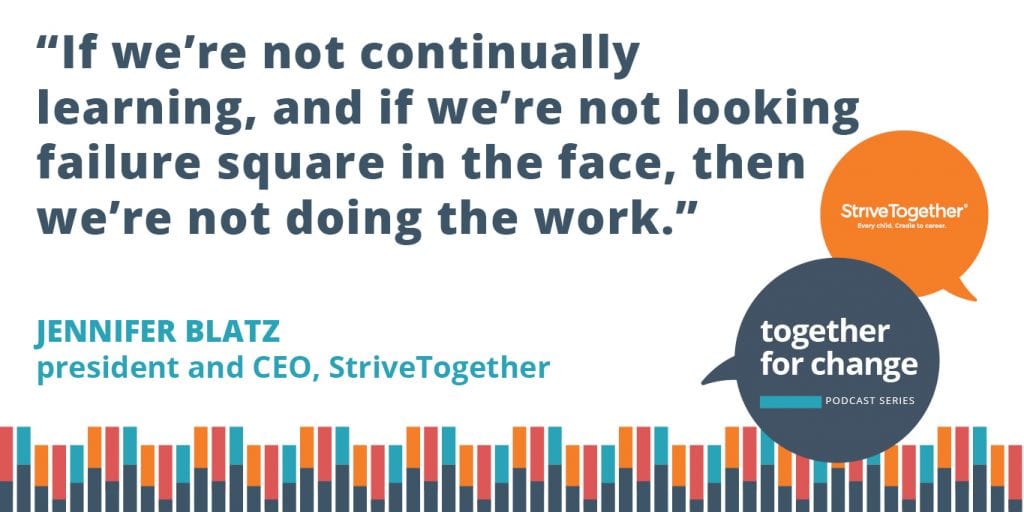
Christian Motley
[09;06] And thank you, Jennifer. And I appreciate, you know, both of your remarks here. Now I’m curious, Geoff, what brought you to this work, and what brought you to Harlem in the social impact model?
Geoffrey Canada
[09:19] That’s a great question. You know, I’m a lot older than Jennifer and as Jennifer was going through three of her challenges, and I thought, “Oh yeah, I did that, too. Yeah, I messed that one up also.” So, Jennifer, I just want you to know, there’s nothing you said — including the issue of race — that I didn’t have to rediscover working in Harlem, which is why this work is really so complicated.
I’ll tell you, data — data brought me to the place of creating the Harlem Children’s Zone. I believed at the time we were called Rheedlen — it didn’t mean anything, it was just a name — that we were really saving kids. We were working with kids from 5 to 12, we were a well-known organization, people had started saying what a great job we were doing, and I believed it.
[10:09] And then one day, somebody said, “What happens to the children when they leave here?” I think they’re fine. And they asked, “Have you ever actually checked?” And I checked, and the children were not fine. Not only were the children not fine, the community continued to crumble around the young people.
And I found out that looking for the silver bullet — we thought you could work with kids till 12, we thought maybe you could deal with teenage pregnancy or maybe with gang prevention. What about substance abuse? Each one of those efforts were important, but alone, they weren’t transforming the lives that our children were living in Harlem. Harlem was going through a really intense time of young people murdering one another over drugs, crack cocaine, and it suddenly hit me that there was not a silver bullet. This was going to be complicated, it was going to take time. And we were going to have to try and think about this in a different way.
[11:12] And the most important thing that we were going to have to do is we were going to have to follow the data to see whether or not what we were doing succeeded. And you know, Christian, I’ll tell you and Jennifer something, my board knows this, when I decided that data was going to be a critical factor, and we were going to be transparent, meaning we were going to admit what we were doing right and admit what we were doing wrong publicly and everybody’s data was going to be up on a board, about a third of my leadership quit.
They just said, “No, I didn’t come here to deal with numbers, I came here to deal with children. You’re becoming all about the numbers,” and they just didn’t want to be part of this transformation we were going through trying to hold ourselves accountable by looking at our results.
[11:58] And so, you know, and I don’t begrudge them, it wasn’t a typical way that folks who worked in poverty thought about the work at that time. But we really felt like we had to figure out what was working and what wasn’t. And the only way we were going to do that is by setting clear standards, and then measuring against those standards, and then holding ourselves accountable.
So the data, if the data had been good, I would have never thought about creating the Harlem Children’s Zone. Following the data led me to understand that what I was doing was actually, you know, failing kids. I was just failing them at a slightly older age than they would have failed if I weren’t doing those early interventions.
Jennifer Blatz
[12:43] Geoff, thank you for sharing that story. And it resonates so, so much. For me, my focus early on in my career was on college access. And I am a first-generation college grad, you know, kind of drew me into college admission, it was my ticket to mobility. So college access and attainment was where I focused the early part of my career.
And similarly, you know, I think it was — and I don’t know if it was, I believe it was the Forum for Youth Investment, or this visual of the leaky pipeline, and really understanding the data — and understanding that, by the time, you know, the population that I’m focused on is here, look at who we’ve lost, and how important it is to look across this pipeline. So similarly, what drew me to the work of the StrivePartnership as it was launching is this opportunity to really look across the pipeline.
[13:43] And people said that we were crazy, that you can’t do all of that. “You’re trying to boil the ocean” was something that I’m sure that you’ve been told many times. It’s, “You can’t look across the entire pipeline, you have to focus on one area or look for that silver bullet,” and you can’t. How can you do that? How can you leave children behind, children and families behind?
And I think that’s what I was hearing as you were sharing what really brought you to the work. And it is, I think we lost people. We had people saying, you know, we had to work on one outcome area, certainly there are agendas in communities around a specific — maybe it’s grade-level reading, or maybe it is postsecondary attainment or workforce. But there is no way. I know StriveTogether and Harlem Children’s Zone and the Promise Neighborhood work is so aligned, is that we have to hold that whole pipeline.
Geoffrey Canada
[14:32] I just really couldn’t agree with you more. And that’s why the work is as hard as it is. But you know, the one thing, Christian, that I think my biggest challenge was the financing part, because folks kept saying to me, “We can’t afford to do it all. So figure out what’s the most important thing that you have to do.” And they kept pushing back on me and pushing back on me. “We can’t afford to do it all.”
And, you know, I’ll tell you how I finally got, I think, them to get off my case about that was I began to push back and say, “So, are you are wealthy?’ And they would say “Yeah, you know, we’re wealthy, as a two-parent family live in a nice place, have great schools.”
[15:18] “Tell me what stage of your child’s life that you could just sort of ignore and think they were going to be fine.” And you know, you push them — “Early childhood?” “No, no, no, no, you know, that’s so important. You got the toxic stress and ACES.” “And middle school?” “No, middle school kids are — no, you’ve got to have folks in middle school drugs and other things.”
The truth of the matter is, middle class, upper middle class, wealthy parents all understand we are terrified that we’re not doing everything humanly possible at every developmental stage of our children’s lives. And somehow we think the poorest, the most fragile, can sort of get it together by 9. And they’re going to be good. Or maybe 14. And it’s all going to be fine. There’s no evidence of that in terms of the research.
[16:04] And I think we’ve got to deal with the fact that this is going to cost us. But the cost is, I think more than made up by the impact of families getting educations, children getting jobs, working, paying taxes. That’s the kind of stuff we should be really focused on, and not trying to force people into deciding, “I’m going to do third-grade reading. I think that’s what’s going to matter for the poorest kids in the country.”
Christian Motley
[16:34] Yeah, you know, that phrase you used, you know, “We can’t afford it all.” I think that’s a phrase that is used in — I think about conversations I’ve had just in like local philanthropy or local government. In the time I spent in the state legislature and Frankfort and Kentucky. When it comes to those budgets, sometimes that is just a phrase that is all too common.
And it made me — I wanted to try to draw a line from there to the, you know, the way that we are having to address this, really these twin pandemics of COVID-19 and systemic racism. And Geoff, I know you warned us, you’re telling us that winter is coming. And you know, we need to be prepared to stave off the devastation of COVID-19 and what it’s wreaking on the Black community.
[17:14] This pandemic has revealed, I think, disparities that we know have existed, vulnerability that we know has existed in communities for some time. And I wonder, I don’t know, what steps do you think local leaders need to take to prepare and protect these communities.
Geoffrey Canada
[17:32] That’s a great question. And my sense right now, is that all of the warnings that scientists have been giving us suggest that there is going to be a huge number of Americans who are going to die and get sick, or get COVID-19 and maybe have longer sort of impacts. And that’s going to be the most devastating in the poorest communities.
And I think we’ve got to redouble our efforts because everybody — you know, we’re all sick of masks. We all want to go out and hang out and have fun. You know, this idea that we have to tell folks, “Six more months.” I’ll tell you what I did. I shouldn’t tell you — I have grown kids and my grandkids are all college age and I was meeting with them in the midst of April and May when it was really bad. And I said, “Hey, guys, we just got to go through three months, right, this thing is going to be better by July.” Well, I knew that wasn’t true. But I didn’t think if I told them it’s going to be 18 months, that they could handle sort of that length of time having to live in such a constrained way.
[18:47] I think we’re in that place right now, we’ve got to tell our folks, “We are close. If we get to spring, there’s going to be vaccines, people are going to be able to stay healthy, you got to wear a mask, you can go out and think that you can be in social settings.” And the real problem is going to be the younger people. Because we see in our schools right now, the kids know they have to have their mask on when they come to our school. So right before they come to school, you see them putting on a mask. The moment they leave school, they’re taking those masks off.
And we got to somehow start a campaign that’s not just about wearing masks but is about protecting your parents and your grandparents. Because this is — this timeframe is almost unimaginable if you’re 13, that you’re going to be locked down, closed off for another six or seven months. And I worry what’s going to happen in our community. So that’s the first thing.
[19:45] Second thing is, this education piece to me. I am so worried about it. Because I was talking to one of the superintendents this morning. And he was just saying there’s huge numbers of kids who aren’t even going to school anymore, they’re not even signing on. They’ve thrown in the towel. It’s horrible. Because again, these aren’t kids from middle-class families. These are the poorest kids, and they’re going to lose another year. And we’re seeing inequality being baked in right now.
So those are two of the areas that I think — look, we can’t do it for everybody. But we have to do it for as many people as we can. We have to talk about masks, we have to make sure they have masks, we got to convince them, “Hey, look, three more months. Let’s just hang in there. Let’s get through the holidays. Don’t take any chances. And let’s try and save as many lives as possible.” Because right now, the numbers look pretty dreadful.
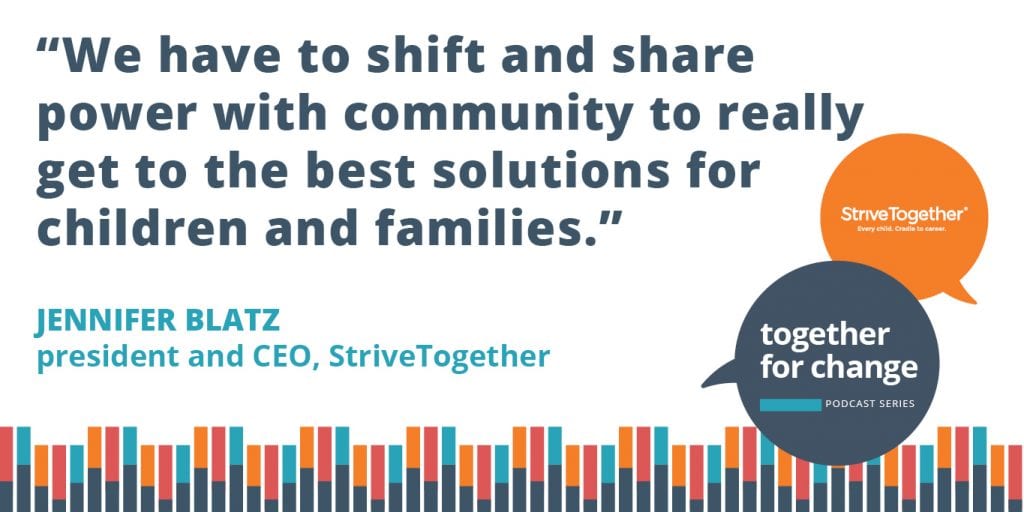
Christian Motley
[20:42] And, Jennifer, I wanted to ask you, and I really — and Geoff, I want to get you in here as well. StriveTogether is a national network of communities, spanning 30 states and Washington, D.C. And we know that this work is very much rooted in communities, often referred to as place-based work.
I want I want to ask, first of all, what is that? Because I do think it’s a phrase that is being highlighted more and more. And then the second question is just why is the focus on place so important in shaping an equitable recovery? Again, as we try to persist through these twin pandemics.
Jennifer Blatz
[21:16] So Christian, yeah, you ask, what is place-based work? And this is something that Geoff and I spend a lot of time on. So I’m happy to start with the definition, but, Geoff, certainly want you to chime in.
And so place-based work differs. But there are some core elements and it is really work to drive towards better, more equitable outcomes that happens in place. And the scope of place can look differently depending on the type of partnership.
[21:45] So at StriveTogether, you mentioned, you know, we do have a national network of communities across 30 states — nearly 70 partnerships. The majority of those partnerships have a geographic scope at the county or multi-county level. But neighborhood work is so critical. And this is why I’m really excited about the partnership that we have with Harlem Children’s Zone and the William Julius Wilson Institute, because place can be defined at the regional level, at the county level, at the multi-county level, but always gets down to the neighborhood-level work.
And we know place matters and place matters down to zip code, because — we knew this before COVID and I think, Christian, as you mentioned, it’s been, you know, the disparities and inequities that exist and that we knew about have been laid bare as a result of COVID — but that where a child or a family is born, their zip code, determines the type of outcomes they can experience they will experience. And Raj Chetty has certainly done a lot of research and sort of put this research out there, around why place matters.
[22:55] And so the work that we do at StriveTogether and within the Harlem Children’s Zone and the William Julius Wilson Institute to really work on creating more equitable outcomes in places are so important. Local context matters. The local community matters. As Geoff was speaking earlier about the work in Harlem and thinking about issues of housing, housing stability, you know, the systemic racism that happens in places was determined many, many years ago as a result of racist policies like redlining. And so to think that we could have a one-size-fits-all approach to improving and creating more equitable outcomes for children and families — especially children and families of color — is crazy. We have to be looking at place, place absolutely matters and is critical.
Geoffrey Canada
[23:46] Well, I love that answer. And thank you. And I’m going to leave the really factual, logical explanations to Jennifer, because she did an excellent job, and I’m totally in agreement. And I’ll talk more about sort of the emotional reasons that place matters.
There’s some places that you’re not supposed to be in after dark. There’s some places that people say, “Well, why would you be going there, are you going there by yourself?” There’s some places when I go into them, and I see the bars on the windows and the bars on the doors, I understand what’s happening in that place that’s different from walking past these nice lawns, where there’s probably security, but it’s not like the bars. Things happen in places, factories close, mines dry up.
[24:38] Segregation leads to redlining that Jennifer was talking about. You can’t think about dealing with problems without understanding place. Part of what is driving the outcomes that the people are dealing with there. If public safety is a key concern of children, it’s going to be very hard to deal with lots of other things if children don’t feel safe and families don’t feel safe.
Places where there are no jobs. You know, William Julius Wilson, he talked about when work disappears — a really famous African American sociologist — and what happened to the social fabric of place when jobs disappeared. And he talked about it in Chicago, but you can see it across this country when jobs leave and addiction increases and substance abuse increases, and child abuse and domestic violence increases and mental health crises go and suicides go up — all of that is because people in that place have lost something critical to their being able to be healthy.
[25:46] So I think of a place as a way of trying to understand how we begin to build the kinds of supports and coalitions and understandings that allow folks to live the American dream. And there are certain places — and you can call them, you know, African American, Latinx, Appalachia — certain places that you just historically have found the kind of underinvestment in those places that’s caused this sort of cascading series of issues and problems that have been resistant to efforts to remediate them up until this point in time.
So you don’t have to have to be too focused on the geographic area, because it’s different. In some places, it’s huge, in some places, it’s really quite small. Where the challenge of place is the driving set of issues that prevent children and adults from being able to live what I would consider to be their most productive lives.
Christian Motley
[26:51] And I think that’s so powerful, especially in the within the context of this idea of place as a framework for being able to do this work. But also reaching back to, Jennifer, your point earlier about how much we’ve learned about the importance of community, authentic community engagement.
The story of place, that’s a story my mother can tell, and that’s a story that everyday community members can tell. They know their places. And it seems just, I don’t know, I just think it’s such an important and powerful piece of this work. Thank you both.
Geoffrey Canada
[27:24] You mentioned your mother and it made me think about my grandparents. And it made me think about the millions of African Americans who left a place, the South, because they were terrorized. The racism was so, I think, open and blatant that they would take any chance to get out of that place and go to a different place. And then you had the urban ghettos forming, because they were restricted from place. They could not go into places in most cities in this country. And they were jammed into certain places that became the only place African Americans can live.
Other folks have dealt with that. Certainly, we know the story of Native Americans in place and what happened to the places that they occupied, and the places they were forced to go to. So this issue of place — when I say the scale, and the scale, the scale thing, sometimes it’s like, you know, a third of the country could be a place that’s causing a crisis for certain people in this country. And sometimes it’s 20 blocks within a neighborhood.
[28:29 ] And I think, understanding what those driving forces on are important and trying to figure out how to bring solutions. So I just felt like I wanted to take your example of your parents and say, yes, this is a part of a history that this country is still dealing with.
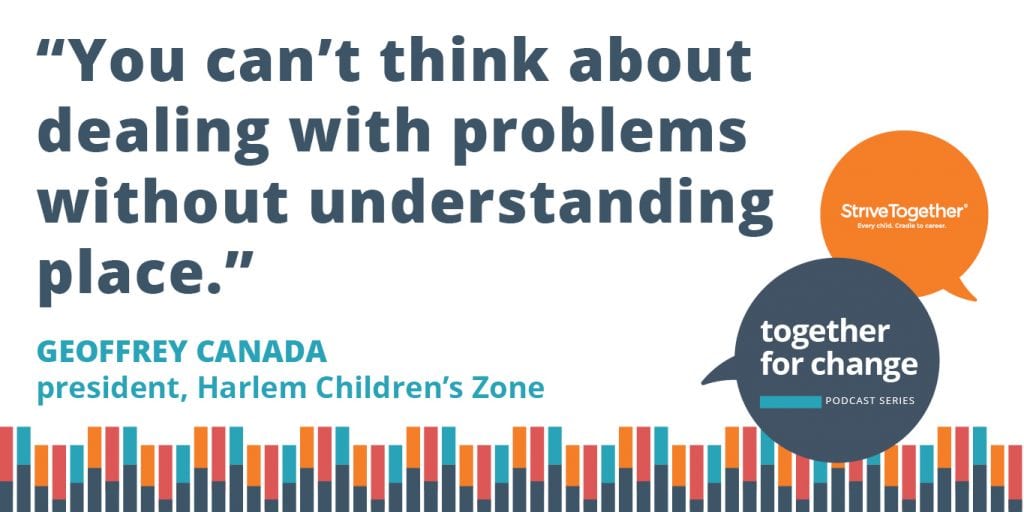
Christian Motley
[28:45] Exactly. And fun fact, Geoff, my mother was born in Queens, Jamaica, Queens, New York, for that very reason. Her mother moved from —
Geoffrey Canada
[28:54] And my mother was born in Harlem. Exactly that reason, came to Kingston, her parents came from Kingston, North Carolina. That’s place.
Christian Motley
[29:05] Right. Well, my last question is for each of you. What would you say to, you know — we always end with a call to action. What would you say to policymakers or philanthropic investors as they look for ways to support an equitable recovery? Jennifer, you want to go first?
Jennifer Blatz
[29:22] Sure, I can go first. I feel like Geoff and I will be quite aligned on this. I mean, first and foremost, we need resources. I think you heard Geoff and I talk earlier about the cost of not doing a part of the whole pipeline far outweighs anything we could imagine. So we have to be able to hold cradle-to-career work, and that’s going to require funding resources, and it has to be patient capital.
The challenges we’re facing may be most broadly and widely seen and felt this year, but they they’ve been there for many years. So now we see these inequities laid bare. And I know we’re, you know, we’re in an economic recession. But the most important economic stimulus that can happen and philanthropy needs to be investing in this this type of work. If we’re truly going to get to an equitable recovery or build back better, we have to have the resources to be able to do that.
[30:20] And the second thing I would say on that is the investment has to be in a mix of upstream and downstream interventions, because we are in crisis. Winter is coming, or winter is here. And so there is a tendency at that time, rightfully so, to invest downstream to immediate supports and interventions, which we have to do. People, children and families need access to stable housing and need food security and have digital access to be able to continue learning. We have to do those downstream interventions.
But it’s also a time for policymakers and philanthropy to look at, what is the root cause, how did we get here? And how do we go upstream and as we’re rebuilding systems build them in a way that produces better, more equitable outcomes for the long term?
Geoffrey Canada
[31:12] I love that. And Jennifer probably won’t be surprised, but I want to answer and support Jennifer’s answer by telling a short story. It’s not my own story. I wish it was. I would certainly claim it, but I heard it and it stayed with me ever since.
A group of folks walking through the woods to hear kids screaming, “I’m drowning, I’m drowning,” and they run to a stream and they see a kid in the river drowning. And this woman just dives in and saves the kid. And no sooner than she gets that kid out, another kid is coming down the river. “I’m drowning. I’m drowning.” A man jumps in and swims and gets that kid out. And no sooner out, than here comes another kid and he’s drowning and only two people left, and one person starts running up the stream.
[31:53] And the guy asked them, “Where are you going? The kids are in the river, they’re drowning.” He says, “You go save the next one, I’m going to go upstream and find out who’s throwing our kids in the river.”
Part of what we have become expert at is saving drowning kids. We go fish them out, we pump their chests we make sure they get — somebody’s got to go upstream and stop these kids from going in the river in the first place.
[32:22] I think that when we say to policy workers, what do we need? We need to support folks who are doing both ends of this thing right now. The folks who were thinking about what do we need to do to stop this from continuing. At the same time, we’re supporting those folks who are diving in the water to save our children. And the shame of America is that there’s plenty of resource to do both. And it is just our lack of will and compassion that prevents us from being able to do a great job at both ends of this same problem.
Christian Motley
[32:58] Thank you. The bumper sticker, the tagline, the last line just about the need for will and compassion is sticking with me. Thank you both. Thank you for joining us today.
Also, big thank you to our listeners. If you learned something new today, pass it on to your family and friends. Stay connected by subscribing to Together for Change and visiting us at StriveTogether.org. Thanks, everybody.
Listen to more episodes and subscribe >>





